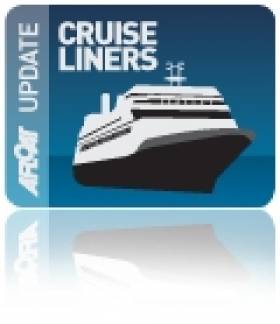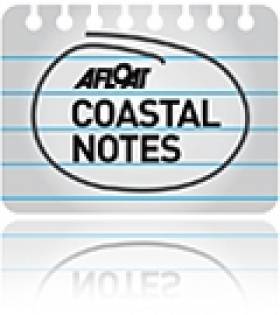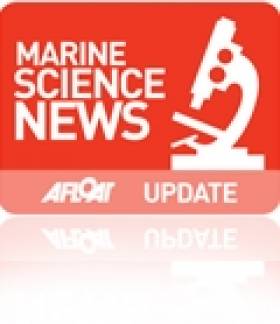Displaying items by tag: Gulf of Mexico
Cruiseship Designed for Great Lakes Calls to Dublin Port
#CRUISELINERS– A vessel at first glanced resembling that of a Mississippi riverboat in reality an ocean-going cruiseship designed also to serve on the US Great Lakes, docked in Dublin Port today, reports Jehan Ashmore.
The 91m Sea Discoverer (4,954grt) berthed at the port's Ocean Pier and without any passengers on board, as the 294 capacity vessel was making an en-route repositioning voyage from the UK to mainland Europe.
Her brief port of call was to carry out a crew-change, following an overnight passage from Barrow-in-Furness in Cumbria, where she had completed a near six-month charter.
Her owners International Shipping Partners (ISP) chartered the luxuriously appointed vessel (click PHOTOS) to Siemens Wind UK for use as an accommodation quarters for personnel working at a wind-turbine installation project.
Sea Discoverer had made a previous call to Dublin Port during August, where the vessel loaded stores and bunkers prior to completing the voyage to Barrow-in-Furness, following a trans-Atlantic voyage.
She is classified by Lloyd's Register (100 A1 LMC) and built to SOLAS (Safety at Life at Sea) lifesaving according to 46CFR and SOLAS 2000.
The Bahamas-flagged vessel has a straight-stemmed bow and a cruiser-stern which are most unusual for a ship only completed in 2001 and to be seen in Irish waters.
Such features reflect her original 'intended' purpose as she was launched as Cape Cod Light along with an earlier sister Cape May Light at the Atlantic Marine shipyard, Jacksonville in Florida.
They were commissioned for American Classic Voyages who planned to operate the sisters in the Great Lakes during the summer months and along the US East coast during Spring and the 'Fall' and the Mexican Gulf as far as Belize for the winter.
American Classic Voyages went bankrupt right after the introduction of Cape May Light (now Sea Voyager) also owned by ISP, which manages a diverse fleet on the charter market globally.
The bankruptcy was due to the aftermath of the September 11 terrorist attacks and the unfinished second sister Cape Cod Light (Sea Discoverer) was repossessed by the shipyard and eventually sold to ISP.
Incidentally American Classic Voyages had acquired the Delta Queen Steamboat Company, operators of the famous Mississippi riverboat Delta Queen, hence the design influence in the Cape May Light and her sister respectively. For photo of the 'Cape's seen moored together click HERE.
According to ISP they are negotiating another charter for Sea Discoverer, also for accommodation purposes in Northern Europe, and they hope to have the contract completed next week.
She sailed out of Dublin Bay late this afternoon, passing The Muglins off Dalkey Island. Her brief call to Dublin Port certainly made for a most usual call by a cruiseship whose role was to operate in the Lakes and on the High Seas.
- Cruiseliners
- Dublin Port
- Cape May Light
- Cape Cod Light
- Mississippi riverboats
- Delta Queen
- Siemens Wind UK
- BarrowinFurness
- Sea Discoverer
- Sea Voyager
- US Great Lakes
- Gulf of Mexico
- US East Coast Ports
- Belize
- Atlantic Marine Shipyard, Jacksonville
- American Classic Voyages
- The Muglins, Dalkey Island
- Dublin Bay
New Oil & Gas Safety Framework to 'Learn Lessons of Gulf'
Ireland's new safety framework for oil and gas extraction and production will be informed by lessons learned after the Gulf of Mexico oil spill, The Irish Times reports.
A report published last week by the Commission for Energy Regulation (CER) outlined that the framework will be developed over the next two years, will be independent of the Department of Energy, and will be implemented in an "open and transparent manner".
The report also highlighted overlaps - and gaps - between state agencies involved in monitoring or working with the oil and gas industry.
One step towards resolving this is the CER's new remit for public safety - which applies to controversial project such as the Corrib gas field.
The Irish Times has more on the story HERE.
U.S. Nobel Laureate Visits Marine Institute in Galway
The Marine Institute headquarters at Oranmore, Co. Galway was honoured last Saturday (6th November) by a visit from US Energy Secretary Prof. Steven Chu, himself a Nobel Prize-winning physicist and long-time advocate of alternative sources of sustainable energy.
This is the latest in a number of VIP visits to the Institute this year, which have included EU-Commissioner for Research, Innovation and Science Máire Geoghegan-Quinn and the Ambassadors to Ireland of both the USA and the United Kingdom, reflecting the growing international recognition of the Institute as a centre of excellence.
During his visit, Professor Chu was briefed by the Institute's CEO Dr Peter Heffernan and members of his senior management team on the Institute's work regarding ocean renewable energy, seabed observatories and the application of "Smart Technology" to ocean monitoring and climate change through such projects as SmartBay and SmartCoast.
He was also briefed on the results of the Irish National Seabed Survey which, at the time of its execution was the largest civilian mapping project in the world, and was given copies of "The Real Map of Ireland" showing the extent of Ireland's underwater territory.
Of particular interest to Prof. Chu, following the recent oil spill in the Gulf of Mexico, was a discussion on the use of new and developing technologies that might allow the deployment of sensor devices on the seabed to monitor offshore oil wells.
































































